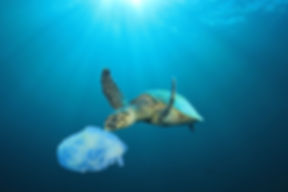


PLASTIC CREDITING
Increasing plastic waste collection and recycling globally.
Plastic is at every turn, it’s on everyone’s mind.
The plastic waste problem has reached a critical point. Companies and consumers around the world are taking notice, especially because standard recycling programs are not preventing the flow of plastic into the environment. We are currently challenged globally with how to increase waste collection and recycling efforts to address the crisis.



Ocean Plastic is a Global Problem
According to a 2017 study, most of the plastic waste is washed into the ocean by rivers, with 90% of all plastic waste being carried to the ocean by ten rivers, eight of which are in Asia. Regardless of where the waste originates, ocean currents distribute it all around the globe into five main gyres that create giant garbage patches.

Visit WWF’s Global Plastic Navigator to see a detailed breakdown of ocean plastic concentration and plastic emissions by location.
Implementing innovative technologies can reduce our use of plastics while removing the waste that plagues us at the same time. Agricultural resources can provide sustainable crops used to replace the current resins use in plastics, while improving soil quality and removing carbon currently.


What are plastic crediting projects?
Plastic crediting projects provide a means of financing activities that verifiably reduce plastic in the environment beyond standard recycling efforts, creating additional innovation and incentive to address the plastic waste crisis. These projects must follow specific third-party requirements and methodologies to generate plastic credits. Each credit represents one metric ton of plastic that has been collected and recycled above baseline rates.
The field of plastic crediting is new and evolving quickly. The definitions and methodologies presented are based on analysis from emerging leaders in this industry and are subject to change.
Plastic waste collection and recycling efforts with proven results
Many recycling efforts fall short without additional resources to expand operations or develop new methods. The key to plastic crediting projects is additionality: to generate plastic credits, a project must prove that the recycling or collection efforts would not take place without additional funding or investment.
The scope of this practice includes recycling activities like collection, sorting, or the production of recycled plastic material. By implementing one of the three methods below, verified recycling projects need to recycle additional plastic waste that would have otherwise been left out of the recycling stream.
NEW OR EXPANDED INFRASTRUCTURE
Increasing recycling infrastructure by building a new facility or expanding capacity at an existing facility to handle more recycling volume
TECHNOLOGY AND INNOVATION
Improving recycling technology at existing recycling locations or innovating ways to process types of plastic that were not previously recyclable
These projects can include collection of waste (from the environment, landfills, or other concentrated sources) or new infrastructure to facilitate waste collection. This practice provides methods to estimate the net plastic waste removed or diverted from the environment through both informal and formal activities.
INFORMAL COLLECTION
Collection of plastic waste by individuals or groups (not connected to official waste management operations) to be recycled, reused, or disposed of in a managed landfill
FORMAL COLLECTION
Collection of plastic from waste streams under the ownership and oversight of organizations recognized by local authorities for recycling or other waste management purposes
INCENTIVIZE PLASTIC COLLECTION
Incentivizing and/or facilitating an increase in the collection of plastic waste for recycling by paying price premiums to collectors or establishing collection points at landfills

Third Party Verification

VERRA’s Plastic Waste Reduction Standard
VERRA is finalizing an open-source standard that will define their Plastic Waste Reduction Program and pioneering robust methods to quantify the impact of recovering and recycling plastic waste. Their Plastic Program will allow project developers to reduce plastic waste across the world by developing social and environmental safeguards and establishing a mechanism for projects to generate credits.